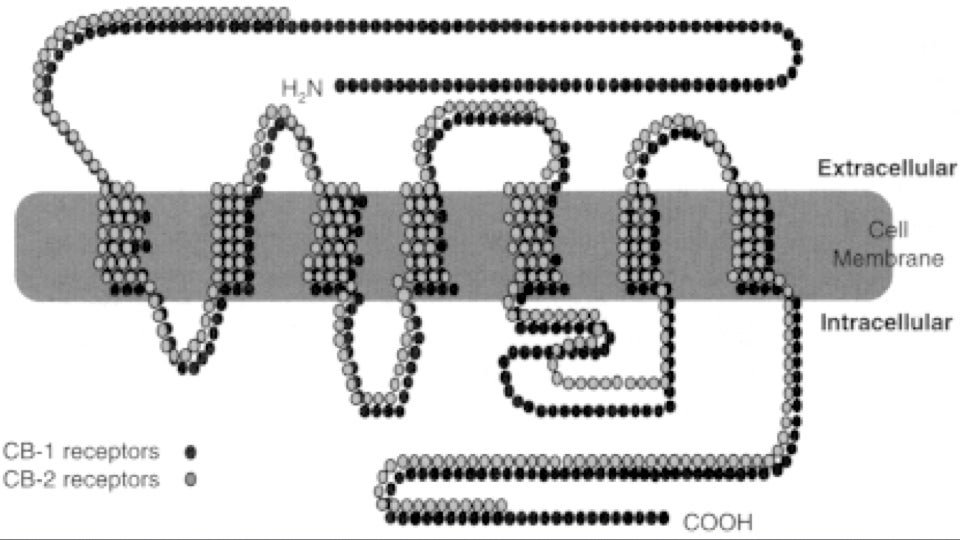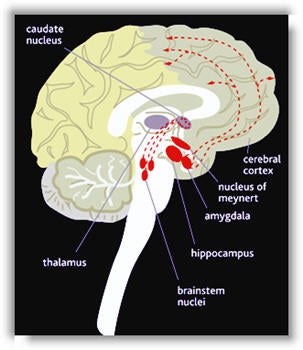Archaeologists recently found a 2,700-year-old pot stash,
so we know humans have been smoking weed for thousands of years. But it
was only about 20 years ago that neuroscientists began to understand
how it affects our brains.
Scientists have known for a while that the active ingredient in cannabis
was a chemical called delta-9-tetrahydrocannabinol, or THC for short.
Ingesting or smoking THC has a wide range of effects, from the
psychoactive "getting high" to the physiological relief of pain and
swelling. It also acts as both a stimulant and depressant. How could one
substance do all that?

Cannabinoid receptors evolved in sea squirts about 500 million
years ago; humans and many other creatures inherited ours from a distant
ancestor we share with these simple sea creatures. THC binds to
receptors in animals as well as humans, with similar effects.
Tasty, tasty, tasty
Cannabis notoriously makes people hungry - even cancer patients who had lost all desire to eat. One study showed
that cancer patients who thought food smelled and tasted awful suddenly
regained an ability to appreciate food odors after ingesting a THC
compound. There are CB1 receptors in your hypothalamus, a part of your
brain known to regulate appetite, and your body's own cannabinoids
usually send the "I'm hungry" message to them. But when you ingest THC,
you artificially boost the amount of cannabinoids sending that message
to your hypothalamus, which is why you get the munchies.
Understanding this process has actually led to a new body of research into safe diet drugs that would block those cannabinoid receptors.
That way, your hypothalamus wouldn't receive signals from your body
telling it to eat, and would reduce hunger cravings in dieters.
What you're forgetting
What's
happening in your brain when smoking pot makes you forget what you're
saying in the middle of saying it? According to the book Marijuana and Medicine (National Academies Press):
One of the primary effects of marijuana in humans is disruption of short-term memory. That is consistent with the abundance of CB1 receptors in the hippocampus, the brain region most closely associated with memory. The effects of THC resemble a temporary hippocampal lesion.
That's right - smoking a joint creates the effect of temporary brain damage.
What
happens is that THC shuts down a lot of the normal neuroprocessing that
goes on in your hippocampus, slowing down the memory process. So
memories while stoned are often jumpy, as if parts are missing. That's
because parts literally are missing: Basically you are saving a lot less
information to your memory. It's not that you've quickly forgotten
what's happened. You never remembered it at all.
A bit of the old timey wimey

Cannabis also distorts your sense of time. THC affects your brain's dopamine system, creating a stimulant effect. People who are stoned often report feeling excited, anxious, or energetic as a result. Like other stimulants, this affects people's sense of time. Things seem to pass quickly because the brain's clock is sped up. At the same time, as we discussed earlier (if you can remember), the drug slows down your ability to remember things. That's because it interferes with the brain's acetylcholine system, which is part of what helps you store those memories in your hippocampus. You can see that system's pathway through the brain in red in the illustration at left.
In an article io9 published last year about the neuroscience of time, we noted:
The interesting thing about smoking pot is that marijuana is one of those rare drugs that seems to interact with both the dopamine and the acetylcholine system, speeding up the former and slowing down the latter. That's why when you get stoned, your heart races but your memory sucks.
It's almost as if time is speeding up and slowing down at the same time.
Addiction and medicine
Some experts call cannabis a public health menace that's addictive and
destroys lives by robbing people of ambition. Other experts call it a
cure for everything from insomnia to glaucoma, and advocate its use as a
medicine. The former want it to be illegal; the latter want it
prescribed by doctors. Still other groups think it should be treated
like other intoxicants such as alcohol and coffee - bad if you become
dependent on it, but useful and just plain fun in other situations.
What's
the truth? Scientists have proven that cannabis does have medical
usefulness, and the more we learn the more intriguing these discoveries
become. Since the early 1980s, medical researchers have published about
how cannabis relieves pressure in the eye, thus easing the symptoms of glaucoma, a disease that causes blindness. THC is also "neuroprotective," meaning in essence that it prevents brain damage. Some studies have suggested that cannabis could mitigate the effects of Alzheimer's for this reason.
At
the same time, we know that THC interferes with memory, and it's still
uncertain what kinds of long-term effects the drug could have on memory
functioning. No one has been able to prove definitively that it does or
does not erode memory strength over time. Obviously, smoking it could
cause lung damage. And, like the legal intoxicant alcohol, cannabis can
become addictive.
Should cannabis be illegal, while alcohol flows?
Unfortunately that's not the kind of question that science can answer.
Let's leave the moral questions to courts, policymakers and shamans.
I'll be off to the side, smoking a joint, thinking about my
acetylcholine system and the many uses of the hippocampus.











Our Cannabis Oil is Pure and potent.Never watered down or diluted,just 100% pure cannabis oil extracted from top quality marijuana grown by us and other professional cultivators in California,laboratory tested,then offered for sale here.Our cannabis oil is packaged in 1 gram and 3.5 gram disposable syringes for easy dispensing.If you aren't sure how to get the cannabis oil out of the syringe,For orders and more information,Kindly contact us on our
ReplyDeleteEmail: ricksimcanabis@gmail.com
phone: +18475128241